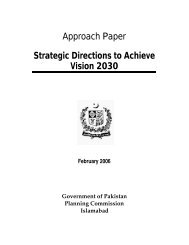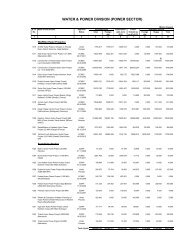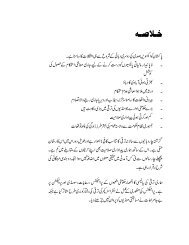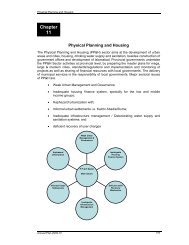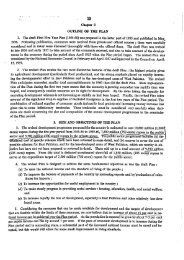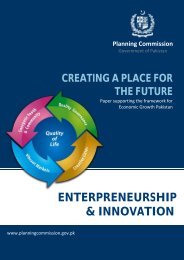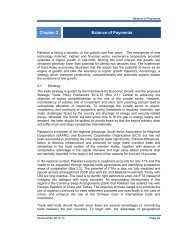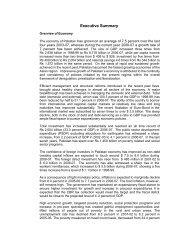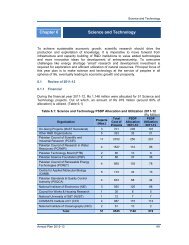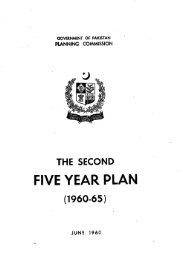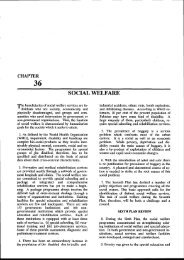Framework for Economic Growth, Pakistan - Planning Commission
Framework for Economic Growth, Pakistan - Planning Commission
Framework for Economic Growth, Pakistan - Planning Commission
Create successful ePaper yourself
Turn your PDF publications into a flip-book with our unique Google optimized e-Paper software.
International conference on “<strong>Framework</strong> <strong>for</strong> <strong>Economic</strong> <strong>Growth</strong>, <strong>Pakistan</strong>”housing, katchi abadis etc. All these issueshave been recurring over a long period oftime in <strong>Pakistan</strong>. But I would like to focushere on an important area which isinstitutional framework under which allabove referred areas have been working.Institutional development framework issuesare very old. Director Generals of thedevelopment authorities are the persons whohave no understanding of the urbanproblems. They come from federal andprovincial Civil Services and they don’thave understanding of the problems relatedto city development like road, traffic,pedestrian traffic, pollution, bicycle lanesetc. In Lahore about 10 to 15 % of thepopulation is utilizing 85% of the cityresources such as roads, electricity, landspace etc. Majority of the population don’thave adequate resources available withthem. In terms of space utilization there is amajor disparity.We need to bring re<strong>for</strong>ms in institutionalframework and urban management. Thesetwo important areas need to be addressed toeffectively respond to urban planning issues.We need to clearly define that who are oururban development managers? One of thepotential solutions is that along with CivilService we need to have another specializedcadre of experts, i.e. urban managers. Thesepeople would serve as urban managers withcontinuity to better understand the problemsof the city.Key solution to urban development is theinstitutional re<strong>for</strong>ms. People from CivilServices come <strong>for</strong> 10 to 18 months and thengo to some other place. Our friend Mr. TahirShamshad has seen two to three bosses inlast two to three years. We need to recognizethat our institutions need strengthening. Weneed people who have understanding of theproblems and are trained in the areas of citydevelopment.***Discussant: Philip Auerswald,Professor, George Mason UniversityI share Richard Florida’s sense whodiscussed about <strong>Pakistan</strong>i cities like Karachiand Lahore and other cities in Asia asShanghai, Singapore. I take city planninglike holding a party <strong>for</strong> 18 million peoplethat would last <strong>for</strong> four years. Holding aparty <strong>for</strong> 200 people that would last threedays requires a lot of work to do that wherethey would stay, what would they eat etc.?To arrange a party <strong>for</strong> 18 million people <strong>for</strong>next thirty years need a lot of work to do. Tohave good time both party organizers andparticipants need to have a sense ofparticipation. Party planning involves topicslike engineering, planning details andthinking in advance. It is not possible tohave a successful party without having aparty planning. City planning, transport,governance etc. all are boring topics whichneed a lot of work and general public don’thave interest and inspiration in such work.When we talk about the violence in cities wetalk about security issues related to thecities. Washington D.C. is the capital of theUnited States and a prosperous city. If welook at violence in Washington D.C. we findthat in 1991 there were 482 murders whichcome to 68 murders per hundred thousand.In 1996 in Karachi there were 1782 murdercases which come to 17 murders perhundred thousand which means thatWashington D.C. is four times more violentplace in terms of murders than Karachi52



